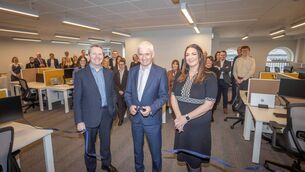Helping students find the path that’s right for them

There has been a ‘huge growth in demand in people choosing alternative education pathways to direct university entry,’ says Nessa White, Solas interim chief executive office.
For anyone considering their next move after doing the Leaving Cert, the Central Applications Office (CAO) looms large.
Every year after Leaving Cert results season, thousands of students find themselves waiting to find out what comes next.
Often, it can seem as though the path forward depends on that CAO offer email – but there’s more than one route to success.
While the points system remains the most common route into higher education around the country, experts say students – and their parents –should not see this as the only option.
From Post-Leaving Certificate (PLC) courses to apprenticeships, there are many paths into a rewarding career, while for some students, embarking on a gap year can offer a chance to expand horizons before starting higher education.
In other words, students today now have the freedom to make the best choice for themselves and their futures.
“We have seen a huge growth in demand in people choosing alternative education pathways to direct university entry,” says Nessa White, Solas interim chief executive officer.
Solas is the further education and training (FET) authority and works with the 16 education and training boards (ETBs) and industry partners.
There has been huge transformation in this area in recent years and one in 10 people nationwide are now participating in the FET or apprenticeship programme.
“Since 2019, there has been an almost 12 per cent increase in those choosing Post-Leaving Certificate (PLC), apprenticeship, and new tertiary degree programmes,” White continues.
“This has been supported by developments such as the CAO website integrating information about FET courses and apprenticeships in 2021, as well as the traditional higher education options.
“This shift is helping more students find the path that’s right for them, whether that’s a pathway into employment or progression into university. Available in every county across Ireland, FET offers flexible, supportive environments where learners can develop their talents at their own pace and in a way that fits their personal and professional lives.”
For students who aren’t sure what they want to do or don’t feel ready for the move into employment or university, PLC courses can be an ideal stepping stone.
“The PLC route can provide a great opportunity for learners to take that additional one to two years after school to discover what sparks their interest before making big decisions about their future,” White explains.

Run by Education and Training Boards (ETBs) across the country, PLCs combine classroom learning with practical experience in everything from journalism to business to IT.
They give students time to mature, gain confidence and build a portfolio of skills before progressing into employment or further education.
Some higher-education institutions even reserve places for PLC graduates, allowing entry to degree programmes without relying solely on Leaving Certificate points.
Another route to a career is via an apprenticeship. Once considered the domain of trades, apprenticeships and are now among the most dynamic career routes available in the State.
In the 2024/25 National Survey of Apprentices, 94 per cent of respondents reported their apprenticeship gave them good employment opportunities.
The field of engineering offers a great example of how all these pathways can lead to a vibrant and in-demand career.
“Engineering is a gateway to some of the most exciting and diverse careers in the world across sectors such as energy, technology, healthcare, housing, and transport,” explains Damien Owens, director general of Engineers Ireland.
“For students with a passion for creativity and making a difference, engineering offers a world of opportunity.” As Owens explains, there are several ways to get into the industry.
Irish universities and third-level institutions provide a broad range of engineering qualifications, many of which are accredited by Engineers Ireland.
“Most universities offer programmes with a shared first year, allowing students to explore core engineering principles before specialising in a particular field,” Owens notes.
Quality and Qualifications Ireland (QQI) and FET offer another route to engineering degree programmes, while apprenticeships are increasingly popular.
“Apprenticeships accredited by Engineers Ireland offer an excellent alternative to the traditional academic pathway,” Owens says.
“They combine practical, on-the-job training with formal learning, making them ideal for individuals who value real-world experience from the outset. Importantly, apprenticeships are paid positions, allowing participants to earn while they learn – gaining valuable industry experience and qualifications simultaneously.”
The paths to a career in engineering are many, but Owens has some words of advice for anyone considering embarking on this journey.
“If you are planning to study engineering, prioritise an Engineers Ireland-accredited programme,” he says.
“Engineers Ireland accreditation is an independent brand of quality, and the role of the accrediting panel is to ensure that the programmes are of the highest quality so that graduates are afforded the best education possible, to achieve internationally recognised and valued engineering competences.”
Of course, not everyone feels ready to jump into further education, training, or a full-time job straight after school and increasingly, young Irish people are embarking on a gap year.
Once dismissed as wasted time, gap years are now seen as opportunities to travel, volunteer or gain work experience before committing to a longer-term plan.
Time spent abroad or in new environments can also help develop valuable soft skills – such as communication, resilience, and independence – all of which will be an asset in any future career.
Whether it’s a university or a PLC place, a gap year full of life experiences, or a practical apprenticeship, one thing is clear: there is no longer just one path for life after the Leaving Cert.
The right path is the one that suits your values and goals and leads the way to the bright future.







